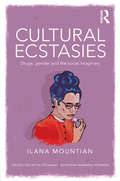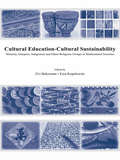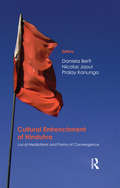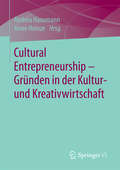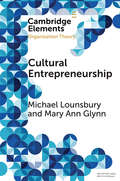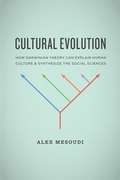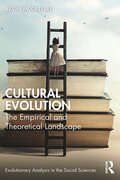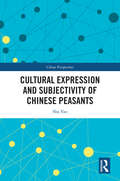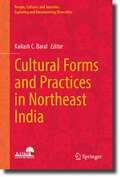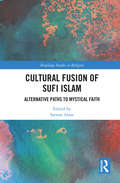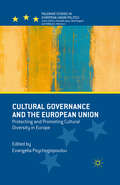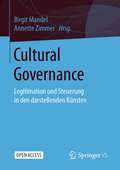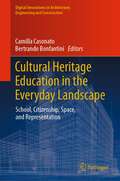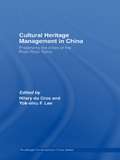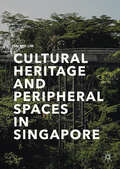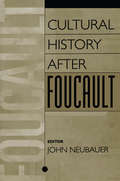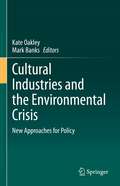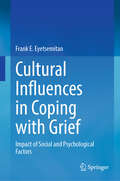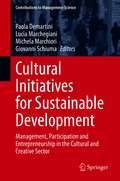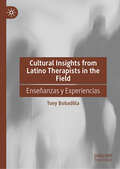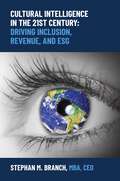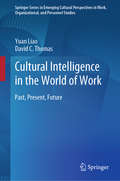- Table View
- List View
Cultural Ecstasies: Drugs, Gender and the Social Imaginary (Concepts for Critical Psychology)
by Ilana MountianIn this important contribution to the field, Ilana Mountian critically analyses discourses surrounding drug addiction, drug prohibition, treatment and prevention, and highlights new ways of understanding the role that gender plays in the ethics of drug use across cultures. The book analyses the discourses of religion, criminality and medicine, and shows how they, combined with key historical events, affect our views of drug use and drug users based on gender, race and class. The book draws on research from a variety of fields to provide alternative conceptual and methodological perspectives on the subject, including: critical theory gender studies post-colonial studies psychoanalysis philosophy. Cultural Ecstasies is an innovative study of drugs and addiction, and will be of great interest to students, researchers and professionals working in psychology, sociology, social work, health care, criminology, and allied disciplines.
Cultural Education - Cultural Sustainability: Minority, Diaspora, Indigenous and Ethno-Religious Groups in Multicultural Societies
by Zvi Bekerman Ezra KopelowitzThis volume is a path-breaking contribution to the study of efforts of diaspora, indigenous, and minority groups, broadly defined, to use education (formal and informal) to sustain cultural continuity while grappling with the influences and demands of wider globalizing, nationalizing, or other homogenizing and assimilatory forces. Particular attention is given to groups that use educational elements other than second-language teaching alone in programs to sustain their particular cultural traditions. The focus of the book on cultural sustainability changes the nature of questions posed in multicultural education from those that address the opening of boundaries to issues of preserving boundaries in an open yet sustainable way. As forced and elective immigration trends are changing the composition of societies and the educational systems within them -- bringing a rich diversity of cultural experience to the teaching/learning process -- diaspora, indigenous, and minority groups are looking more and more for ways to sustain their cultures in the context of wider socio-political influences. This volume is a first opportunity to consider critically multicultural efforts in dialogue with educational options that are culturally particularistic but at the same time tolerant. Academics will find this an excellent reference book. Practitioners will draw inspiration in learning of others’ efforts to sustain cultures, and will engage in critical reflection on their own work vis-à-vis that of others. Teachers will realize they do not stand alone in their educational efforts and will uncover new strategies and methodologies through which to approach their work.
Cultural Entrenchment of Hindutva: Local Mediations and Forms of Convergence
by Daniela BertiThe book reflects on the discreet influence of Hindutva in situations/places outside or at the margins of its organisational and mobilisational arena, where people denying any commitment to the Sangh Parivar, incidentally, show affinities and parallelisms with its discourse and practice. This study looks at Hindutva’s entrenchment not so much as an orchestration from above but more as an outcome of a process that evolves in relation to specific social and cultural milieus.The contributors analyse Hindutva’s entrenchment, emphasising on the ethnography of the forms of mediation and/or convergence produced in certain contexts. The 11 case studies highlight three different dynamics of Hindutva’s cultural entrenchment. The first section gathers cases where RSS-affiliated organisations have set up specific cultural or artistic programmes at the regional level, involving the meditation of local people whose interest in these programmes does not necessarily mean that they endorse the Hindutva agenda completely. The next deals with convergence and refers to cases where the followers gather around a charismatic personality, whose precepts and practice may bring them towards a closer affinity with the Hindutva programme. The last section deals with the contexts of resistance, where social milieus engaged in opposing Hindutva may, in fact, paradoxically, and even inadvertently, imbibe some of its ideas and practices in order to contest its claims.
Cultural Entrepreneurship - Gründen in der Kultur- und Kreativwirtschaft
by Andrea Hausmann Anne HeinzeDer vorliegende Sammelband hat das Ziel, die Besonderheiten von Gründungen in der Kultur- und Kreativwirtschaft auszuloten und Maßnahmen und Lösungsansätze im Hinblick auf Finanzierung, Förderung, Marketing und Netzwerkmanagement vorzustellen. Renommierte Experten aus Wissenschaft und Praxis beleuchten Chancen und Risiken für Gründungen in der Kultur- und Kreativwirtschaft. Best-Practice-Beispiele und Tipps für erfolgreiche Gründungen runden die Inhalte des Sammelbandes ab.
Cultural Entrepreneurship: A New Agenda for the Study of Entrepreneurial Processes and Possibilities (Elements in Organization Theory)
by Mary Ann Glynn Michael LounsburyThis Element provides an overview of cultural entrepreneurship scholarship and seeks to lay the foundation for a broader and more integrative research agenda at the interface of organization theory and entrepreneurship. Its scholarly agenda includes a range of phenomena from the legitimation of new ventures, to the construction of novel or alternative organizational or collective identities, and, at even more macro levels, to the emergence of new entrepreneurial possibilities and market categories. Michael Lounsbury and Mary Ann Glynn develop novel theoretical arguments and discuss the implications for mainstream entrepreneurship research, focusing on the study of entrepreneurial processes and possibilities.
Cultural Essentialism in Intercultural Relations (Frontiers of Globalization)
by Fred Dervin Regis MachartThe concept of culture has long been criticized, with many scholars reformulating it or discarding it entirely. The field of intercultural communication and relations, however, still relies on culture to examine interculturality and this volume provides a comprehensive examination of the problems that the concept poses today.
Cultural Evolution: How Darwinian Theory Can Explain Human Culture & Synthesize the Social Sciences
by Alex MesoudiCharles Darwin changed the course of scientific thinking by showing how evolution accounts for the stunning diversity and biological complexity of life on earth. Recently, there has also been increased interest in the social sciences in how Darwinian theory can explain human culture. Covering a wide range of topics, including fads, public policy, the spread of religion, and herd behavior in markets, Alex Mesoudi shows that human culture is itself an evolutionary process that exhibits the key Darwinian mechanisms of variation, competition, and inheritance. This cross-disciplinary volume focuses on the ways cultural phenomena can be studied scientifically—from theoretical modeling to lab experiments, archaeological fieldwork to ethnographic studies—and shows how apparently disparate methods can complement one another to the mutual benefit of the various social science disciplines. Along the way, the book reveals how new insights arise from looking at culture from an evolutionary angle. Cultural Evolution provides a thought-provoking argument that Darwinian evolutionary theory can both unify different branches of inquiry and enhance understanding of human behavior.
Cultural Evolution: How Darwinian Theory Can Explain Human Culture And Synthesize The Social Sciences
by Alex MesoudiCharles Darwin changed the course of scientific thinking by showing how evolution accounts for the stunning diversity and biological complexity of life on earth. Recently, there has also been increased interest in the social sciences in how Darwinian theory can explain human culture. Covering a wide range of topics, including fads, public policy, the spread of religion, and herd behavior in markets, Alex Mesoudi shows that human culture is itself an evolutionary process that exhibits the key Darwinian mechanisms of variation, competition, and inheritance. This cross-disciplinary volume focuses on the ways cultural phenomena can be studied scientifically-from theoretical modeling to lab experiments, archaeological fieldwork to ethnographic studies-and shows how apparently disparate methods can complement one another to the mutual benefit of the various social science disciplines. Along the way, the book reveals how new insights arise from looking at culture from an evolutionary angle. Cultural Evolutionprovides a thought-provoking argument that Darwinian evolutionary theory can both unify different branches of inquiry and enhance understanding of human behavior.
Cultural Evolution: The Empirical and Theoretical Landscape (Evolutionary Analysis in the Social Sciences)
by Kevin McCaffreeSince the dawn of social science, theorists have debated how and why societies appear to change, develop and evolve. Today, this question is pursued by scholars across many different disciplines and our understanding of these dynamics has grown markedly. Yet, there remain important areas of disagreement and debate: what is the difference between societal change, development and evolution? What specific aspects of cultures change, develop or evolve and why? Do societies change, develop or evolve in particular ways, perhaps according to cycles, or stages or in response to survival necessities? How do different disciplines—from sociology to anthropology to psychology and economics—approach these questions? This book provides complex and nuanced answers to these, and many other, questions. First, the book invites readers to consider the broad landscape of societal dynamics across human history, beginning with humanity’s origins in small nomadic bands of hunter gatherers through to the emergence of post-industrial democracies. Then, the book provides a tour of several prominent existing theories of cultural change, development and evolution. Approaches to explaining cultural dynamics will be discussed across disciplines and schools of thought, from "meme" theories to established cumulative cultural evolutionary theories to newly emerging theories on cultural tightness-looseness. The book concludes with a call for theoretical integration and a frank discussion of some of the most unexamined structures that drive cultural dynamics across schools of thought.
Cultural Evolution: The Empirical and Theoretical Landscape (Evolutionary Analysis in the Social Sciences)
by Kevin McCaffreeSince the dawn of social science, theorists have debated how and why societies appear to change, develop and evolve. Today, this question is pursued by scholars across many different disciplines and our understanding of these dynamics has grown markedly. Yet, there remain important areas of disagreement and debate: what is the difference between societal change, development and evolution? What specific aspects of cultures change, develop or evolve and why? Do societies change, develop or evolve in particular ways, perhaps according to cycles, or stages or in response to survival necessities? How do different disciplines—from sociology to anthropology to psychology and economics—approach these questions? This book provides complex and nuanced answers to these, and many other, questions. First, the book invites readers to consider the broad landscape of societal dynamics across human history, beginning with humanity’s origins in small nomadic bands of hunter gatherers through to the emergence of post-industrial democracies. Then, the book provides a tour of several prominent existing theories of cultural change, development and evolution. Approaches to explaining cultural dynamics will be discussed across disciplines and schools of thought, from "meme" theories to established cumulative cultural evolutionary theories to newly emerging theories on cultural tightness-looseness. The book concludes with a call for theoretical integration and a frank discussion of some of the most unexamined structures that drive cultural dynamics across schools of thought.
Cultural Expression and Subjectivity of Chinese Peasants (China Perspectives)
by Sha YaoAs the famous sociologist Fei Xiaotong argued, “the real life of most Chinese can only be seen in the villages.” Peasants not only comprise a significant part of the Chinese population but represent a distinctive culture and one that is expressed in its own particular way. This makes for an important area of study for scholars in communication studies. This volume investigates how Chinese peasants express their culture and adapt to social change. The author’s research consists of participant observation and interviews of shadow puppetry artists in Guanzhong, China, illustrating how peasant artists have adapted to the historical and social changes since the founding of the People’s Republic of China. He discovers that Chinese peasants integrate urban popular culture with their own aesthetic criteria, even if the mainstream discourse of the Chinese community overlooks the subjectivity of peasants. He goes on to put forwards a creative analytical framework for the studies of the dynamics of “subject-time-space.” Scholars and students of anthropology, sociology, and communication studies, especially rural communication studies, will find this an ideal case study.
Cultural Forms and Practices in Northeast India (People, Cultures and Societies: Exploring and Documenting Diversities)
by Kailash C. BaralThe present book examines cultural diversities of Northeast India. The sixteen essays included in the volume cover various aspects of cultural forms and their practices among the communities of Northeast. The present volume is expected to serve as a bridge between vanishing cultural forms and their commodification, on the one hand, and their cultural ritual origins, evolution and significance in identity formation, on the other. The book analyses continuity of cultural forms, their representations and often their reinventions under globalisation. Further, the book underlines historical forces such as colonialism and religious conversion that have transformed communities and their cultural practices. Yet some of the pre-colonial, ritual-performative traditions hold on. Through insightful analyses, this book offers an informed view of the region’s historical, ethnic and cultural practices. It is expected that the volume will be useful for scholars and students interested in Northeast studies.
Cultural Fusion of Sufi Islam: Alternative Paths to Mystical Faith (Routledge Studies in Religion)
by Sarwar AlamIt has been argued that the mystical Sufi form of Islam is the most sensitive to other cultures, being accommodative to other traditions and generally tolerant to peoples of other faiths. It readily becomes integrated into local cultures and they are similarly often infused into Sufism. Examples of this reciprocity are commonly reflected in Sufi poetry, music, hagiographic genres, memoires, and in the ritualistic practices of Sufi traditions. This volume shows how this often-side-lined tradition functions in the societies in which it is found, and demonstrates how it relates to mainstream Islam. The focus of this book ranges from reflecting Sufi themes in the Qur’anic calligraphy to movies, from ideals to everyday practices, from legends to actual history, from gender segregation to gender transgression, and from legalism to spiritualism. Consequently, the international panel of contributors to this volume are trained in a range of disciplines that include religious studies, history, comparative literature, anthropology, and ethnography. Covering Southeast Asia to West Africa as well as South Asia and the West, they address both historical and contemporary issues, shedding light on Sufism’s adaptability. This book sets aside conventional methods of understanding Islam, such as theological, juridical, and philosophical, in favour of analysing its cultural impact. As such, it will be of great interest to all scholars of Islamic Studies, the Sociology of Religion, Religion and Media, as well as Religious Studies and Area Studies more generally.
Cultural Governance and the European Union: Protecting and Promoting Cultural Diversity in Europe (Palgrave Studies in European Union Politics)
by Evangelia PsychogiopoulouThis edited collection brings together distinguished scholars across a range of academic disciplines to explore how the European Union engages with culture. The book examines the ways in which cultural issues have been framed at the EU level and the policies and instruments to which they have given vent.
Cultural Governance: Legitimation und Steuerung in den darstellenden Künsten
by Annette Zimmer Birgit MandelIm internationalen Vergleich verfügt Deutschland über einen bemerkenswerten Theatersektor im Hinblick auf Ensembles und Spielstätten. Die darstellenden Künste sind zudem der Kulturbereich mit der höchsten öffentlichen Förderung. Theater ist daher in besonderer Weise abhängig von der Politik. Was bedeutet das für den Alltag der Theatermacher*innen? Wie und mit welchen Zielsetzungen greift Kulturpolitik in die darstellenden Künste ein? Welche Governance-Strukturen lassen sich erkennen? Antworten auf diese Fragen geben Ergebnisse der DFG-Forschungsgruppe „Krisengefüge der Künste“, die das Zusammenspiel von Politik, Organisation und künstlerischer Produktion untersucht. Die Beiträge dieses Open Access Buches decken ein breites Themenspektrum ab, das von Fallbeispielen kulturpolitischer Governance und Legitimationsstrategien einzelner Häuser, über empirische Studien zur Beschäftigungssituation und zur Wahrnehmung von Theater in der Bevölkerung bis hin zu Analysen ästhetischer Neu-Formatierungen reicht.Die HerausgeberinnenDr. Birgit Mandel ist Professorin für Kulturvermittlung und Kulturmanagement am Institut für Kulturpolitik der Universität Hildesheim.Dr. Annette Zimmer ist Professorin für Deutsche und Europäische Sozialpolitik und Vergleichende Politikwissenschaft am Institut für Politikwissenschaft der Westfälischen Wilhelms-Universität Münster.
Cultural Heritage Education in the Everyday Landscape: School, Citizenship, Space, and Representation (Digital Innovations in Architecture, Engineering and Construction)
by Camilla Casonato Bertrando BonfantiniThis book summarizes work being undertaken within the School Activates Resources—stitching the lost heritage of the suburbs (ScAR) project, which addressed cultural heritage in a broad sense, as a system of values identified by the populations and in constant evolution. This tangible and intangible heritage fuels the promotion of intergenerational and intercultural dialogue and represents an opportunity for resilient social and territorial development. The book ponders the experience gained and the points of view of the different disciplines involved, examines issues such as children and youth participation in civil life or education in cultural heritage and landscape, and presents real-world experiences of heritage education in everyday landscape in difficult contexts and/or concerning poorly recognized and valued cultural heritage.
Cultural Heritage Management in China: Preserving the Cities of the Pearl River Delta (Routledge Contemporary China Series #Vol. 20)
by Hilary Du Cros Yok-shiu F. LeeCultural Heritage Management in China presents a thematic examination of the development of cultural heritage management (CHM) in an Asian context. It challenges assumptions of the primacy of community-sponsored action and heritage authority based on Western-derived ideals and practices that fit with democratic models for civil action. The multidisciplinary team of international contributors analyze four key case studies of cities along the Pearl River Delta examining their administrative characteristics, economic growth and their relationship with cultural identity and human relationships. Providing an innovative study of cultural heritage management, this book will be of interest to students of Asian and cultural studies, as well as offering valuable insights into Asian culture and society itself.
Cultural Heritage and Peripheral Spaces in Singapore
by Tai Wei LimThis book documents through first-hand experience and academic research the historical, cultural and economic interactions affecting land use in Singapore. Offering a unique study of nostalgia in Singaporean heritage, it discusses the subjective nostalgic meanings and interpretations that users of peripheral, heritage and green spaces in Singapore create and maintain, through a combination of informal observations and interactions combined with research into local history and heritage. It addresses the subjective meaning-making processes of individuals within the larger theoretical frameworks that structure understandings of changing land use and economical changes which impact on contemporary cityscapes, centered around peripheral and de-privileged areas of Singapore's economic development.
Cultural History After Foucault
by John NeubauerBoth as historian and maker of culture, Foucault infused numerous disciplines of study with a new conceptual vocabulary and an agenda for future research. His ideas have called central assumptions in Western culture into question and altered the ways in which scholars and social scientists approach such issues as discourse theory, theory of knowledge, Eros, technologies of the Self and Other, punishment and prisons, and asylums and madness.The contributors to this volume indicate Foucault's achievements and the suggestive power of his work, as well as his methodological weaknesses, historical inaccuracies, and ambiguities. Above all, they attempt to show how one can use Foucault to go beyond him in opening new approaches to cultural history. Though comprehensiveness was not attempted, their essays broach the major controversial aspects of Foucauldian cultural history--the position of the subject, the fusion of power and knowledge, sexuality, the historical structures and changes--and they explicitly analyze them with respect to antiquity, the Renaissance, and the nineteenth century.In this collection, Neubauer presents analyses by historians, literary scholars, and philosophers of the entire, transdisciplinary range of Foucault's oeuvre, emphasizing the rich suggestiveness of its agenda. The breadth of the undertaking makes it suitable for seminars and graduate courses in numerous departments.
Cultural Industries and the Environmental Crisis: New Approaches for Policy
by Kate Oakley Mark BanksThis volume critiques the current model of the creative economy, and considers alternative models that may point to greener, cleaner, more sustainable and socially just cultural and creative industries. Aimed at the nexus of cultural and environmental concerns, the book assesses the ways in which arts and cultural activities can help develop ideas of the ‘good life’ beyond excessive and unsustainable material consumption, and explores the complex interactions between cultural prosperity, place and the quality (and availability) of employment, leisure and the rights to self-expression. Adopting a deliberately wide and inclusive interdisciplinary and international perspective, contributors to this volume showcase current and future ways of ‘doing’ creative economy, ecologically, otherwise and differently. In 11 chapters, the book outlines some of the most relevant arguments from among the growing literature that critically analyzes the current creative economy, with a focus on issues of gentrification, inequality and environment. This volume is timely, as it emerges into a political and economic context that is seeking desperately to ‘reboot’ the economy, re-establish ‘business as usual’ and to do so partly through significant investment and expansion in the creative economy. The book will be suitable for upper level undergraduates and postgraduates studying a wide range of topics, including: cultural and creative industries, media and communications, cultural studies, cultural policy, human geography, environmental humanities and environmental policy, and will be of further interest to arts professionals, creative economy researchers and policymakers. The chapter “Towards a New Paradigm of the Creative City or the Same Devil in Disguise? Culture-led Urban (Re)development and Sustainability” is available open access under a Creative Commons Attribution 4.0 International License via link.springer.com.
Cultural Influences in Coping with Grief: Impact of Social and Psychological Factors
by Frank E. EyetsemitanThis book appeals to scholars and students interested in culture and bereavement. Bereavement occurs in a socio-cultural context, which helps to provide an understanding of how people would cope with grief, accordingly. For example, coping with grief in the context of the workplace would be different than coping with grief in the case of a spousal loss. When compared to competing books, this book&’s approach is unique. Topics covered include widowhood, abortion, death anxiety, dying experience, workplace bereavement, resilience, disenfranchised grief, and grief rituals. Unlike competing books, culture is given prominence beyond religion, in coping with grief.
Cultural Initiatives for Sustainable Development: Management, Participation and Entrepreneurship in the Cultural and Creative Sector (Contributions to Management Science)
by Giovanni Schiuma Lucia Marchegiani Paola Demartini Michela MarchioriThis book explores the relevance of new sources, dimensions, and characteristics of knowledge for supporting creative and cultural organizations and initiatives.Special emphasis is placed on cultural heritage, participatory approaches, and entrepreneurship in the cultural and creative sector. The role of cultural heritage and contemporary culture as a source of economically effective, socially sustainable development is also discussed. The authors examine new ways of developing and testing new and innovative models of management for cultural heritage assets. In line with the participatory approaches in culture heritage governance promoted by the EU, the authors analyze participatory approaches to cultural and creative initiatives. The role of public and private actors, as well as the way they interact with each other in order to achieve collective outcomes, is of particular interest in this section of the book. With regard to cultural and creative entrepreneurship, the book adds an innovative view of cultural ventures, offering some clues from an entrepreneurial ecosystem perspective.
Cultural Insights from Latino Therapists in the Field: Enseñanzas y Experiencias
by Tony BobadillaThis book offers a unique glimpse into the world of culturally diverse psychotherapists by exploring the professional experiences of Latino clinicians. Through their narratives, these therapists provide distinct and essential case studies that emphasize the significance of their identities as catalysts for transformation within the field of mental health. Rich with real-world examples, this book captures pivotal moments in the lives of these therapists, presented in narrative or testimonio formats. By incorporating these personal experiences, the book contributes significantly to the processes of decolonization and the re-centering of power within marginalized communities. It acknowledges the complex dynamics these individuals navigate as they interact with various systems, offering fertile ground for growth and change. These clinicians represent a range of identities, including first-generation immigrants, individuals from low socioeconomic backgrounds, first-generation college attendees, Latinx individuals, bilingual practitioners, and those with bicultural backgrounds.
Cultural Intelligence in the 21st Century: Driving Inclusion, Revenue, and ESG
by Stephan M. BranchDiscover how leadership, cultural intelligence, and inclusion coalesce to create preeminent global leaders and organizations while driving revenue, inclusion, and ESG.If you are a CEO, global leader, or part of a global organization, you can revolutionize every part of your business by raising your cultural intelligence. Cultural Intelligence in the 21st Century explores nine crucial cultural competencies that will transform every part of your business, including: how you drive inclusion, revenue, and ESG how you lead global teams for better results how you increase sales and operational performance how you communicate across cultures how you build relationships and trust in other countries In recent years, organizations have become fixated on raising Environmental, Social, and Governance (ESG) because they recognize that the Millennial and Z generations are largely focused on investing in companies that better align with their personal philosophies. Global 2000 companies know this and are redirecting much of their focus to ESG in order to make their organizations more attractive to employees and investors. The &“S&” in ESG isn&’t only about social equity; it&’s about understanding the importance of how other countries conduct business. Did you know you can solve both at the same time while having a transformative financial impact on your organization? How can you build a globally inclusive culture in an organization where everyone feels seen, heard, and respected if you don&’t understand how cultures communicate, build relationships and trust, and show respect differently? You can learn the cultural competencies to do business in other countries in order to create a more inclusive environment within a global organization, which qualifies as a metric within the ESG rating. Cultural Intelligence in the 21st Century gives you the competencies you need to do this.
Cultural Intelligence in the World of Work: Past, Present, Future (Springer Series in Emerging Cultural Perspectives in Work, Organizational, and Personnel Studies)
by David C. Thomas Yuan LiaoThis book provides a comprehensive review of both the theoretical development and empirical study of the concept of cultural intelligence. A review of previous work on cross-cultural competence provides an historical backdrop against which the two main theories of cultural intelligence are presented. These two approaches, as well as the assessments derived from them, are compared and evaluated. Issues associated with the measurement of cultural intelligence are examined in detail. An important feature of the review of the empirical work on cultural intelligence is that results are discussed in terms of the relationship of the four sub dimensions of the Cultural Intelligence Scale (CQS) and also that results using the Short Form Cultural Intelligence Scale (SFCQ) and other measures of the concept are included. The review of empirical work includes studies that cast cultural intelligence as an antecedent, as a dependent variable, and as a moderator and a mediator. Cultural intelligence at the group and organizational levels are also discussed. Finally, this review sets the stage for a discussion of appropriate future directions in the study of cultural intelligence. Scholars in organizational psychology interested in the concept of cultural intelligence will find this an essential guide.
